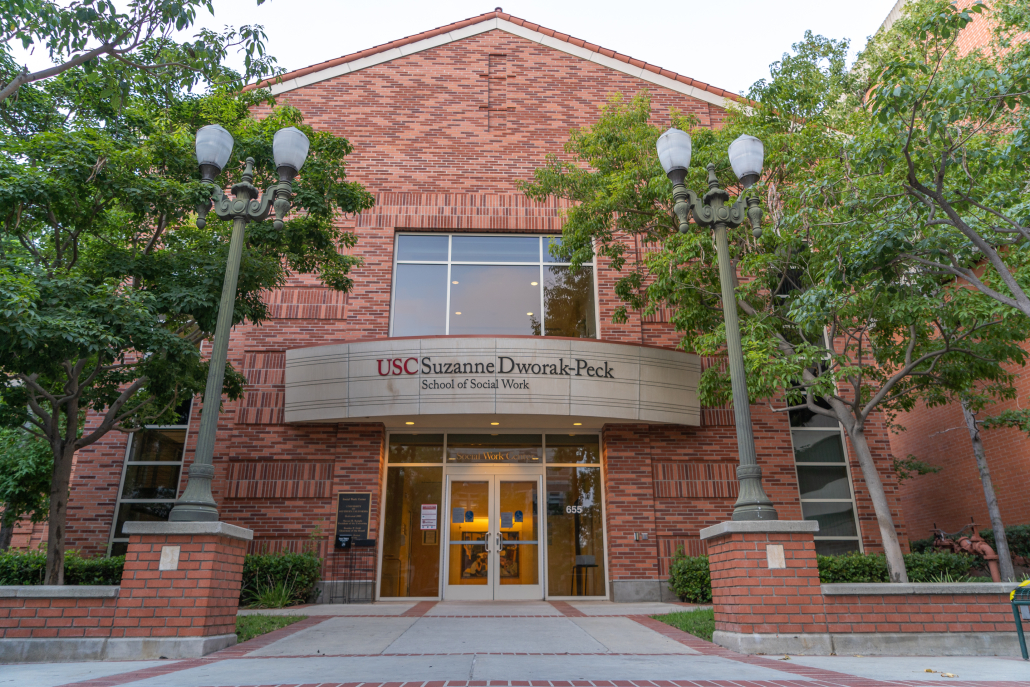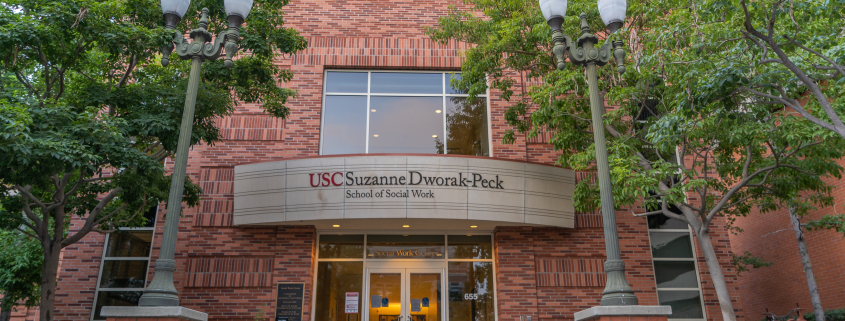USC faculty named Fulbright scholars

Content warning: This article contains references to suicide, self-harm and domestic violence.
On a visit to the San Quentin State Prison, clinical professor emerita Anne Katz met a man she’d never forget. At 17, he committed murder. Now 70 and having spent more than 50 years behind bars, the man saw himself as a “different person.” Katz has devoted a great deal of her academic and professional efforts to helping improve the lives of others, driven by a principle she gleaned from hearing his story: that people can change.
Katz, along with clinical associate professor Jennifer Lewis, are among the latest USC faculty members granted Fulbright Specialist awards for their work at the Suzanne Dworak-Peck School of Social Work.
Katz, who believes incarceration policies should adapt to reflect the growth that many aging prisoners experience, received the award for her work looking into programs that benefit aging women prison inmates and spending time with ex-prisoners. Lewis, who directed her work to suicide prevention after noticing a high prevalence of suicides occurring in her hometown of San Diego, will use the award to continue developing strategies for prevention.
Katz’s Fulbright award will send her to the Oxford Institute of Population Ageing for six weeks where she will continue to explore the relationship between prisons and aging women inmates, which she hopes will raise awareness about the topic. Lewis will attend Queen’s University in Belfast to further her studies in finding community-driven approaches to suicide prevention.
Katz and Lewis were among a select number of USC faculty awarded in the academic year 2020-2021. Their awards were deferred to the academic year 2021-2022 as a result of the coronavirus pandemic.
Inspired by the various problems within the prison system, including an overall neglect to think about inmates’ human needs, Katz said receiving the Fulbright Scholarship has given her hope that she can shine more light on the issues and develop effective programs for the aging women prison population.
Katz, who worked at the Davis School of Gerontology for 24 years before moving to the School of Social Work, began to look deeper into the aging prison population after one of her students, Aileen Hongo, visited a women’s prison in Chino for an assignment to research older adults. Following this, Katz and Hongo continued to engage in various programs geared toward helping incarcerated women and studying the aging population.
“Most of the women I talked to killed their spouse or their partner … Back then, there wasn’t the battered women’s law, and they probably wouldn’t be in prison now,” Katz said. “Many of them were very poor. A lot of them had trauma.”
Since graduating in 2007, Hongo has continued working in prisons, specifically with women inmates. She currently teaches a reentry parenting class to prepare those who have been incarcerated for long periods of time to reunite with their families.
“Dr. Katz has a gift: the gift to see outside the box,” Hongo said. “I’m just so happy for [Katz] because she’ll take [the award] and run with it … She’s not afraid, and she’s so empathetic to a population that really doesn’t have a voice.”
To combat the isolation, lack of identity and various other challenges that women inmates face, Katz said she hopes to expand model programs like the Gold Coats, which works to help sick and aging people who have been incarcerated. Katz’s ultimate goal is to ensure prisoners get the aid they need to live in safer, healthier environments.
In addition to teaching in USC’s social work doctorate program and multiple advanced trauma courses, Lewis primarily focuses on developing suicide prevention methods by restricting access to lethal means. As opposed to suicide prevention research that centers around early detection signs of self-harm or early behavioral interventions, Lewis’ work aims to discover ways to implement obstacles into spaces prone to suicide attempts.
Through her research process, Lewis delved into suicidal ideation and learned that constructing barriers is rather effective at deterring the execution of thought-out, specific plans.
“When we reduce access to lethal means, when we reduce access to those plans … it gives [individuals] time to get help in that immediate crisis and, oftentimes, leads to a reduction in suicide,” Lewis said.
Lewis co-authored “Organizing for Suicide Prevention: A Case Study at the Golden Gate Bridge” alongside Paul Muller, the executive director of the Bridge Rail Foundation of the Golden Gate Bridge. The book manualizes the steps readers can take to install physical barriers and engage the community as mental health advocates.
“We need to work on multiple fronts in terms of clinically teaching people the skills to, what we call, emotionally self-regulate, to self-soothe in the face of a bump in the road,” Lewis said. “The more we teach early these self-regulation skills to kiddos, to adolescents at schools … the better off we’ll be as adults.”
Lewis said the scholarship will allow her to engage in solutions in a broader landscape by working with stakeholders in Belfast, Ireland. There, she will continue to advocate for human-centered design processes for bridges similar to San Francisco’s Golden Gate to produce an “international guide.”
Lewis views the opportunity as a means to engage in practical solutions on a broader landscape while representing USC.
“It’s a great honor because I think the Fulbright Program is highly esteemed, but more so because it enables me to have conversations with communities that would have never occurred prior,” Lewis said.
Help is available for anyone who needs it. Students dealing with mental health concerns can contact the 24/7 phone line (213) 740-9355 for professional assistance from USC Mental Health Services. If you are concerned about a fellow Trojan, you can notify Trojans Care 4 Trojans by calling (213) 821-4710. If you are experiencing thoughts of suicide, you can reach The National Suicide Prevention Lifeline at 1-800-273-8255.

